 |

For further information, contact the MBL Communications Office at (508) 289-7423 or e-mail us at comm@mbl.edu
FOR IMMEDIATE RELEASE, November 17, 2008
Contacts:
Gina Hebert, MBL, 508-289-7725, ghebert@mbl.edu
Angus McQuilken, MLSC, 617-921-7749, amcquilken@masslifesciences.com
Howard Hughes Medical Institute Awards $15 Million to MBL for Loeb Laboratory Renovations
State Funding Commitment in Life Sciences Act Helps Leverage Major Private Investment
 |
Press conference from November 17, 2008
Watch Streaming Video
Download the video
Video:
NECN coverage
High-resolution photos: Click on thumbnail for full size image |
|
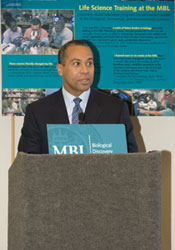 |
|
Governor Deval Patrick announces a $15 million award from the Howard Hughes Medical Institute to the MBL. Photo Credit: Tom Kleindinst
|
|
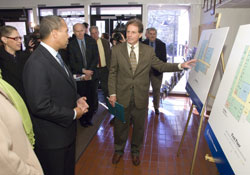 |
|
Gary G. Borisy, Director and Chief Executive Officer of the MBL shows floorplans of the proposed renovations to Governor Patrick. Photo Credit: Tom Kleindinst
|
|
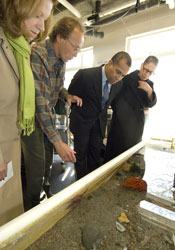 |
|
MBL Scientist Roger Hanlon shows a cuttlefish to Governor Deval Patrick, Senate President Therese Murray, and Massachusetts Life Sciences Center President and CEO, Susan Windham-Bannister at the MBL's Marine Resources Center. Photo Credit: Tom Kleindinst
|
|
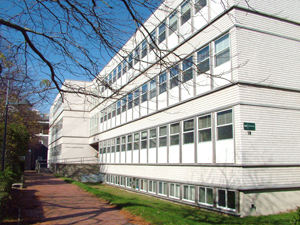 |
|
The Loeb Laboratory. Photo Credit: Beth Liles
|
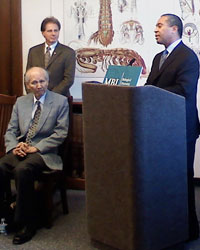 |
 |
MBL CEO Gary Borisy, and 2008 Nobel prize winner Osamu Shimomura look on as Governor Deval Patrick announces a $15 million award from the Howard Hughes Medical Institute to the MBL. Photo Credit: Pamela Wilmot
|
|
MBL, WOODS HOLE, MA—The Howard Hughes Medical Institute (HHMI) has awarded $15 million to the Marine Biological Laboratory (MBL) to fund top-to-bottom renovations to the MBL’s Loeb Laboratory, the cornerstone of its world-famous life science training programs. The grant was announced at a press conference today with Massachusetts Governor Deval Patrick, Senate President Therese Murray, Dr. Susan Windham-Bannister, President & CEO of the Massachusetts Life Sciences Center, MBL Director and CEO Gary Borisy and other local officials. The private grant was leveraged through a $10 million commitment of state funds contained in the Massachusetts Life Sciences Act. The Massachusetts Life Sciences Center’s Board of Directors will consider release of those funds at their meeting on Tuesday, November 18th.
The three-story Loeb Laboratory houses the MBL’s intensive, full-immersion graduate and postdoctoral-level laboratory courses.
“Faculty and students come to the MBL not to do exercises, but to do original, cutting-edge research,” said Gary Borisy, director and chief executive officer of the MBL. “We are deeply grateful to HHMI for this award, which recognizes the importance of our discovery-based education programs to the past and future of biology, biomedicine, and the life sciences.”
"The Marine Biological Laboratory has been training leading scientists through a number of truly extraordinary summer courses, some of which have been offered for more than a century. Many of our HHMI investigators, students and postdoctoral fellows have taken - and some have even taught - these courses. HHMI is pleased to support such a thriving and long-running research training program," said Jack E. Dixon, Ph.D., vice president and chief scientific officer at the Howard Hughes Medical Institute.
The cost of the renovation will total more than $25 million. The $15 million HHMI grant is complemented by a $10 million authorization for infrastructure improvements at the MBL which is included in the $1 billion Massachusetts Life Sciences Act, signed into law by Governor Deval Patrick on June 16, 2008. When released by the Massachusetts Life Sciences Center Board of Directors, the MBL will apply the funds to the Loeb Laboratory renovation.
“The Life Sciences Act was designed to both create jobs, and support life-saving research, and I am delighted to see part of this important funding put to use with the vital research being done at the Marine Biological Laboratory in Woods Hole,” said Governor Deval Patrick. “This is a terrific example of leveraging private investment in economic development through the targeted use of public resources.”
"In the area of Life Sciences, Massachusetts and the Marine Biological Laboratory are known for cutting edge research and educational opportunities. It is critical that we have the facilities to match that reputation," said Senate President Therese Murray. "That is why the Commonwealth made the initial $10 million investment, and with that commitment MBL was able to secure the $15 million grant from the Howard Hughes Medical Institute. This grant proves that small investments by the Commonwealth can reap great benefits."
“The Massachusetts Life Sciences Center is pleased to be partnering with MBL on this very important project,” said Dr. Susan Windham-Bannister, President & CEO of the Massachusetts Life Sciences Center. “As we implement the provisions of the Life Sciences Act, we are looking to make investments that promote both economic development and good science. Research conducted at MBL has had an enormous impact in creating positive medical outcomes for people, as demonstrated by the 56 scientists affiliated with MBL that have received the Nobel Prize since MBL’s founding in 1888, including this year’s Nobel Prize for Chemistry. MBL plays a key role in our state’s life sciences community, and we look forward to working with MBL and their regional partners, including UMass Dartmouth and the Regional Technology Development Council, as this project comes to fruition.”
The MBL is a premier training ground for tomorrow’s leaders in the biological, biomedical, and environmental sciences. Each year the MBL trains more than 450 students, including 200 international students, as part of its education programs, which include more than 20 graduate and post-graduate laboratory courses. MBL alumni and faculty rank among the most innovative and successful scientists of our time.
The atmosphere in the Loeb Laboratory is one of taking risks, creativity, and intensive experimentation. From new ways to map neural circuits to new tools to assess abnormal development, students and faculty at the MBL work at the cutting edge of life science research. Significant discoveries have been made in the MBL’s hallmark summer courses, including research recognized by the Nobel Prize.
Massachusetts is home to one of the world's top life sciences clusters, with a high concentration of academic medical centers, researchers, entrepreneurs, pharmaceutical, medical device and biotechnology companies in close proximity. Yet despite the region’s strength, nine out of 10 employers in life sciences-related fields are having difficulty hiring enough staff to conduct clinical research, and 75 percent reported having problems locating staff with engineering and life science regulatory experience, according to a report released earlier this year by the Massachusetts Life Sciences Center, Mass Biotech, and the University of Massachusetts Donahue Institute. Renovation of the Loeb Laboratory will enable the MBL to enhance Massachusetts’ life sciences training by improving its premiere educational training programs and preparing students and workers for jobs in the life sciences sector.
“I’ve worked with five Governors and this is the first one who ‘gets it’ regarding the importance of the Woods Hole life sciences institutions, and he has put the Commonwealth into the mix as a partner in this important work,” said Representative Eric Turkington. “He understands that the work of these institutions is not only important for Woods Hole and Falmouth, but for the whole Commonwealth, the whole country, and the entire world.”
“Encouraging the innovative genius of the Woods Hole institutions is one of the keys to the future,” said Representative Matt Patrick. “I'm very proud to have played a role in bringing the MBL's story to the State House.”
The MBL has chosen two Massachusetts-based companies to work on the project. Tsoi/Kobus & Associates of Cambridge are serving as architects of the renovation while construction managers are Shawmut Design and Construction of Boston. Both firms worked very successfully with the MBL in the past, most recently to renovate its Rowe Laboratory in 2006-2007. The design phase of the Loeb project has begun and preliminary construction is scheduled to begin in March 2009. The completion date will be June 2010. It is expected that at the peak of the project, more than 200 tradespeople will be working on the renovation.
Loeb Laboratory was built in 1970 and is named after Jacques Loeb, a prominent physiologist in the early 20th century and founder of the MBL’s Physiology course. In addition to Physiology, Loeb Laboratory is home to the MBL’s Embryology, Neurobiology, Frontiers in Reproduction, and Frontiers in Human Embryonic Stem Cells training courses, among others.
The MBL is a leading international, independent, nonprofit institution dedicated to discovery and to improving the human condition through creative research and education in the biological, biomedical and environmental sciences. Founded in 1888 as the Marine Biological Laboratory, the MBL is the oldest private marine laboratory in the Western Hemisphere. For more information, visit www.MBL.edu.
The Massachusetts Life Sciences Center (MLSC) is a quasi-public agency of the Commonwealth of Massachusetts. The MLSC was established to promote the life sciences within the Commonwealth of Massachusetts. It is tasked with investing in life sciences research and economic development. This work includes making financial investments in public and private institutions growing life sciences research, development and commercialization as well as building ties between sectors of the Massachusetts life sciences community. For more information visit www.masslifesciences.com.
|